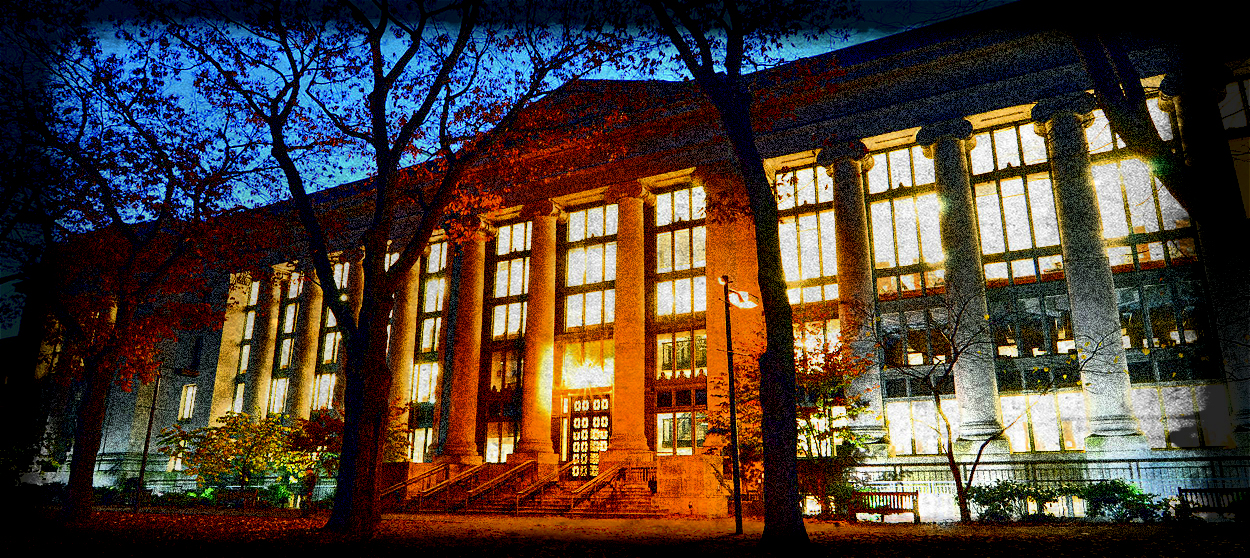How and why elite colleges should pass the buck on social justice
College admissions have become a band-aid for all social ills. Here's what can be done about it.


A free daily email with the biggest news stories of the day – and the best features from TheWeek.com
You are now subscribed
Your newsletter sign-up was successful
Harvard is making headlines again — and not in a good way.
The nation's oldest university is entangled in a lawsuit, in which plaintiffs claim its admissions office has been discriminating against Asian-American applicants. They attest that if Asian-Americans were judged solely by their academic qualifications, they'd make up 50 percent of the student body, not the 23 percent they actually do. This has put Harvard administrators in the awkward position of debating the "likability" of an entire ethnic group, while high school principals cry in court over the injury that racial bias has done to their students. For Harvard's public relations office, it's been a bad few months.
We should expect to see more such scenes in coming years. Universities are increasingly finding themselves in an awkward place, as their efforts to appear socially conscious clash with their core functions as scholarly and educational institutions. They want to be regarded as benevolent catalysts for positive social change, but the public is becoming skeptical. It's time for universities to refocus, but for that to be possible, they will have to start passing the buck on social justice.
The Week
Escape your echo chamber. Get the facts behind the news, plus analysis from multiple perspectives.

Sign up for The Week's Free Newsletters
From our morning news briefing to a weekly Good News Newsletter, get the best of The Week delivered directly to your inbox.
From our morning news briefing to a weekly Good News Newsletter, get the best of The Week delivered directly to your inbox.
Competitive schools have committed themselves to an impossible mission. They want to attract the nation's best and brightest, grooming them for leadership and elite careers. At the same time, they also want to function as guardians and promoters of cherished social goals: inclusivity, greater racial harmony, expanding opportunity for all. Most Americans are similarly conflicted: We want to have elite universities that are committed to developing top talent, because we all want capable leaders, cutting-edge researchers, and top-notch entrepreneurs. But we also aspire to having an ethnically, religiously, and socio-economically integrated society.
No one wants to choose between these goals, but realistically there can be trade-offs between excellence and access. The most effective mission plan is not always the most fair.
If we can tear our eyes momentarily from those luscious crimson-and-blue banners, we might reflect that virtually everyone across the political spectrum agrees that certain sub-groups in America face challenges that begin well before college admissions. The left likes to talk about structural inequality, while the right has more to say about fragmenting family structures, but everyone appreciates that American kids begin life from dramatically different starting points, with substantially different odds of success. That's troubling, and we should go on discussing solutions. But we can't expect elite schools to function as a band-aid for all of our social ills. Their primary job is to cultivate excellence, and if we hope to enjoy the fruits of that excellence, we may need to give universities a pass on certain social goals.
So what should the country's most competitive schools do? I'd recommend two things: First they should adopt more transparent and obviously meritocratic admissions policies. Then they should stress their eagerness to serve as a valuable public resource, while taking clear steps to make that a visible reality.
A free daily email with the biggest news stories of the day – and the best features from TheWeek.com
On the first point, Caltech provides the obvious template. It's a highly competitive school that has made a point of rejecting the "holistic" application model in favor of grades, test scores, and highly competitive math-and-science-related achievements. Caltech's student body is typically more than 40 percent Asian-American, and women are a minority. Black, Hispanic, and Native American students are sufficiently few that the registrar's listing lumps them all together as "Underrepresented Minorities"; all these groups together comprise only 15 percent of the undergraduate student body. These numbers certainly might give us pause. From an educational standpoint, though, Caltech's results are impressive. Their students do well in life, excelling in a range of STEM fields.
Other institutions could adopt similar approaches without necessarily sharing Caltech's focus on STEM. Harvard offers a broader range of academic programs, so it would make sense to give applicants more credit for advanced written and analytic skills, facility with languages, elite musical talent, and so forth. Personal qualities might be relevant too, but legacy admissions and other special favors would need to be dramatically scaled back. The goal should be to discern which students are most capable of succeeding in elite programs, not to decide who deserves the honor. The truth is, most people don't have the wherewithal to thrive in a rigorous academic program, just as most people will not thrive in a marine boot camp. By focusing their energies on the people who can most benefit from them, universities can underscore their value as a public resource.
To make this effort credible, universities must also combat grade inflation. This would actually be easy, if schools only had the will to do it. Grade inflation has become a serious problem in the past few decades, and the results are very noticeable. As a graduate-student instructor at Cornell, I was appalled by the entitlement of students who would regularly appear in my office arguing that they needed a higher grade because the one I had assigned would negatively affect their futures. (The running joke among the graduate students was that it was our job to keep those people out of law school.) Grade inflation undercuts academic standards, enabling students to focus less on their studies and more on their social lives. But it also has the perverse effect of magnifying the admissions process into an all-important social sorting ritual. People won't fight so ardently for spaces in elite universities if it's clear that the underqualified can actually fail.
As they pivot to a more meritocratic admissions model, universities might improve their public image with a renewed effort at community outreach. To help compensate for their likely less-diverse student bodies, they should express full-voiced enthusiasm for social reforms that might increase the number and diversity of qualified applicants. Provide support for students willing to participate in mentorship efforts and volunteer programs, either in the summer or immediately post-graduation.
At the same time, faculty and graduate students need to find better ways of making themselves available to the general public. Why should the public support institutions that have no obvious impact on their lives? Public lectures, continuing-education programs, and community-outreach initiatives can provide helpful access points for ordinary citizens who simply want to learn. Cultural events are another great way of opening up cloistered campuses, thus proving to the public that universities have real value even for those who don't formally work or study there. The Ivory Tower may be intrinsically elitist, but most people are willing to tolerate elitists who are helping to improve their lives and communities. Universities ignore this truth at their peril.
In some ways, it is refreshing to see elite schools concerning themselves about social justice. We may have reached the point, though, where the effort is simply counterproductive. Elite admissions processes can never truly be fair.
Instead of agonizing over the relative merits of different ethic groups, elite schools should concern themselves with cultivating excellence. In the long run, everyone will benefit.
Rachel Lu is a writer based in Roseville, Minnesota. Her work has appeared in many publications, including National Review, The American Conservative, America Magazine, and The Federalist. She previously worked as an academic philosopher, and is a Robert Novak Journalism Fellow.
-
 The ‘ravenous’ demand for Cornish minerals
The ‘ravenous’ demand for Cornish mineralsUnder the Radar Growing need for critical minerals to power tech has intensified ‘appetite’ for lithium, which could be a ‘huge boon’ for local economy
-
 Why are election experts taking Trump’s midterm threats seriously?
Why are election experts taking Trump’s midterm threats seriously?IN THE SPOTLIGHT As the president muses about polling place deployments and a centralized electoral system aimed at one-party control, lawmakers are taking this administration at its word
-
 ‘Restaurateurs have become millionaires’
‘Restaurateurs have become millionaires’Instant Opinion Opinion, comment and editorials of the day
-
 The billionaires’ wealth tax: a catastrophe for California?
The billionaires’ wealth tax: a catastrophe for California?Talking Point Peter Thiel and Larry Page preparing to change state residency
-
 Bari Weiss’ ‘60 Minutes’ scandal is about more than one report
Bari Weiss’ ‘60 Minutes’ scandal is about more than one reportIN THE SPOTLIGHT By blocking an approved segment on a controversial prison holding US deportees in El Salvador, the editor-in-chief of CBS News has become the main story
-
 Has Zohran Mamdani shown the Democrats how to win again?
Has Zohran Mamdani shown the Democrats how to win again?Today’s Big Question New York City mayoral election touted as victory for left-wing populists but moderate centrist wins elsewhere present more complex path for Democratic Party
-
 Millions turn out for anti-Trump ‘No Kings’ rallies
Millions turn out for anti-Trump ‘No Kings’ ralliesSpeed Read An estimated 7 million people participated, 2 million more than at the first ‘No Kings’ protest in June
-
 Ghislaine Maxwell: angling for a Trump pardon
Ghislaine Maxwell: angling for a Trump pardonTalking Point Convicted sex trafficker's testimony could shed new light on president's links to Jeffrey Epstein
-
 The last words and final moments of 40 presidents
The last words and final moments of 40 presidentsThe Explainer Some are eloquent quotes worthy of the holders of the highest office in the nation, and others... aren't
-
 The JFK files: the truth at last?
The JFK files: the truth at last?In The Spotlight More than 64,000 previously classified documents relating the 1963 assassination of John F. Kennedy have been released by the Trump administration
-
 'Seriously, not literally': how should the world take Donald Trump?
'Seriously, not literally': how should the world take Donald Trump?Today's big question White House rhetoric and reality look likely to become increasingly blurred
